Can chickens eat tomatoes? Yes, chickens enjoy eating various fruits and vegetables, and tomatoes are a great source of nutrients for them. Tomatoes provide important vitamins and minerals, including Vitamin C, potassium, and beta-carotene. Additionally, tomatoes are a good source of antioxidants, which help protect the body from disease.
There are some things to consider when feeding chickens tomatoes. Too many tomatoes can impact egg production and cause diarrhea. Feeding tomatoes as part of a healthy and balanced diet is important.
This article will tell you everything you need to know about feeding your chickens tomatoes, including the benefits of tomatoes for chickens and things to watch out for.
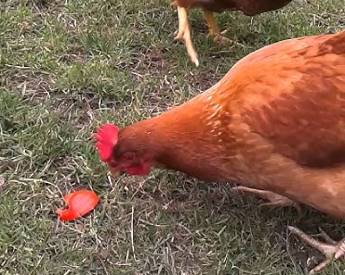
Can chickens eat tomatoes?
Chickens are omnivorous animals, meaning they can eat both plants and animals. In the wild, chickens typically eat a diet of seeds, insects, and other small creatures. However, farm chickens often have a more varied diet, including fruits and vegetables.
So, can chickens eat tomatoes? The answer is yes. Tomatoes are a good source of vitamins A and C, as well as lycopene, an antioxidant that can help to boost the immune system. Chickens can safely eat both cooked and raw tomatoes.
However, it is important to note that you should only give tomatoes in moderation. Like all food that contains natural sugar, too many tomatoes can lead to weight gain and health problems in chickens.
As a result, it is best to offer tomatoes as part of a balanced diet.
[ChickenAffiliate]
The benefits of eating tomatoes for chickens
Not only do tomatoes provide a tasty treat for chickens, but they also offer many health benefits.
Good source of vitamins and minerals
Tomatoes are a good source of vitamins A and C, potassium, and fiber. Vitamin A is essential for good vision, while vitamin C helps to boost the immune system.
Potassium is important for muscle function, and fiber helps chickens digest their food properly.
Keeps chickens hydrated
Tomatoes can also help chickens to stay hydrated since they contain a high percentage of water. In hot weather, or when chickens are molting (losing their feathers), it is especially important to ensure they get enough water.
Offering tomatoes as part of their diet can help ensure that they stay hydrated and get the fluids they need.
Cancer-preventing properties
In addition, the lycopene in tomatoes has been shown to have cancer-preventing properties.
While more research is needed in this area, it is thought that lycopene may help to protect cells from damage that can lead to cancer.
Good for digestive health
Tomatoes are also a good source of soluble fiber, which can help to keep the digestive system healthy. Soluble fiber helps chickens to maintain regular bowel movements and can also help to reduce cholesterol levels.
Adding tomatoes to your chicken’s diet can provide several health benefits and improve overall health.
What to watch out for when feeding chickens tomatoes
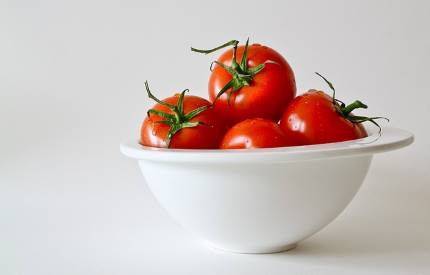
While tomatoes offer many benefits for chickens, there are a few things to keep in mind while feeding them this delicious fruit.
Moderation is key
As with all food, it is important to feed tomatoes to chickens in moderation. Eating too many tomatoes can lead to weight gain and health problems, such as diarrhea.
A good rule of thumb is to offer tomatoes as part of a healthy and balanced diet. This means including other fruits and vegetables, as well as a variety of different foods.
Remove the stem and leaves
Before feeding tomatoes to your chickens, be sure to remove the stem and leaves. These parts of the plant can poison chickens and make them sick if eaten.
The stem and leaves contain a compound called solanine, which can cause gastrointestinal distress in chickens. Solanine is also found in other nightshade plants, such as potatoes and eggplants.
Any green part of the tomato plant contains high levels of solanine and should be avoided.
Choose ripe tomatoes
When selecting tomatoes for your chickens, it is best to choose ripe ones. Ripe tomatoes are lower in acidity and easier for chickens to digest.
Unripe tomatoes can cause stomach upset in chickens, so it is best to avoid them. Unripe tomatoes also contain more solanine than ripe ones.
Cut tomatoes into small pieces
It’s best to cut tomatoes into small pieces before being fed to chickens. Small pieces will help to prevent choking and make it easier for chickens to eat them.
How often should chickens eat tomatoes?
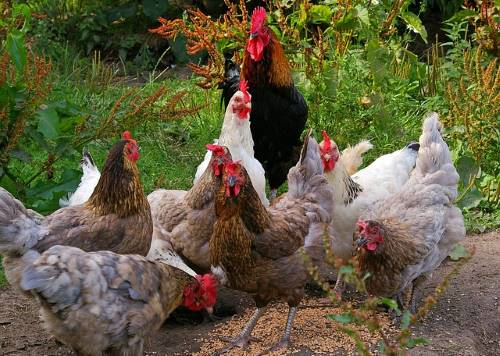
How often should chickens eat tomatoes? It depends on the chicken. Some chickens love tomatoes and eat them every chance they get, while others only peck at them occasionally.
Chickens can eat tomatoes as often as they like, but it is best to offer them as part of a balanced diet. This means that tomatoes should not be the only fruit or vegetable your chickens eat.
The best way to figure out how often your chicken should eat tomatoes is to offer them some and see what happens. If they seem to enjoy them, then feel free to give them a few slices daily.
However, if they don’t seem interested, then there’s no need to force them to eat something they don’t like. Just offer a variety of other fruits and vegetables and let them choose what they want to eat.
How to feed chickens tomatoes
One way to feed tomatoes to chickens is to chop them up and mix them into their regular feed. This is an easy way to add some extra nutrition to their diet and can help to encourage egg production.
Another way to feed tomatoes to chickens is to offer them whole tomatoes as a treat. This can be a messy option, but it allows the chickens to peck at the tomatoes like any other food.
Finally, you can make a tomato drink for your chickens by boiling chopped tomatoes in water and then straining the liquid.
A tomato drink can provide a refreshing drink for your chickens on hot days and can also help to boost their immune system.
Can baby chicks eat tomatoes?
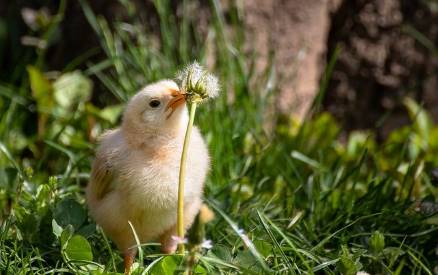
Baby chicks are very delicate creatures and need to be fed a diet high in protein and nutrients to grow into healthy adults.
While tomatoes are healthy food for humans, they are not ideal for baby chicks. Tomatoes are high in acidity, which can upset a chick’s delicate stomach. In addition, the skin and seeds of a tomato can be hard for a chick to digest.
For these reasons, it is best to feed tomatoes to baby chicks occasionally. However, once they reach adulthood, chickens can safely eat tomatoes as part of a healthy diet.
Can chickens eat tomato seeds?
Yes, tomato seeds are fine for chickens to eat. Many chicken owners prefer to feed their chickens tomato seeds because they are a good source of protein.
There’s no need to remove the seeds from the tomatoes before feeding them to your chickens, but you can if you want to.
Some chicken owners believe that removing the seeds helps to prevent chickens from developing digestive problems. However, there is no scientific evidence to support this claim.
Ultimately, it’s up to you whether or not to remove the seeds from the tomatoes before feeding them to your chickens.
Can chickens eat tomato leaves?
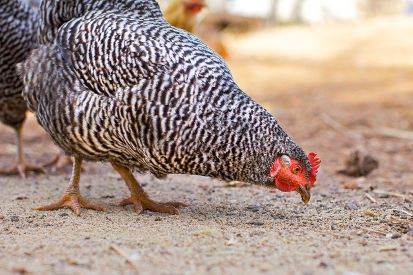
Tomato plants are popular for home gardens, and their delicious fruit is a staple in many kitchens. But what about the leaves? Are they safe for chickens to eat?
Due to the solanine present in tomato leaves, it is not recommended that chickens eat them. Solanine is a toxin that can cause gastrointestinal distress in chickens.
While a small amount of solanine is not likely to harm your chicken, it is best to err on the side of caution and avoid feeding them tomato leaves.
Can chickens eat the stems and flowers of a tomato plant?
No, chickens should not eat the stems or flowers of a tomato plant. These parts of the plant contain high levels of solanine, which is toxic to chickens.
Any green part of the tomato plant, including the stem and leaves, is off-limits to chickens. These parts of the plant contain solanine, which is a toxin that can make chickens very sick.
If your chicken does eat any green part of the tomato plant, keep an eye on them for signs of illness, such as lethargy, diarrhea, or vomiting. If you see any of these signs, take your chicken to the vet immediately.
While the green parts of the plant are dangerous to chickens, the red fruits of the plant are perfectly safe for them to eat. Chickens can enjoy tomatoes just as much as we do!
Can chickens eat moldy tomatoes?
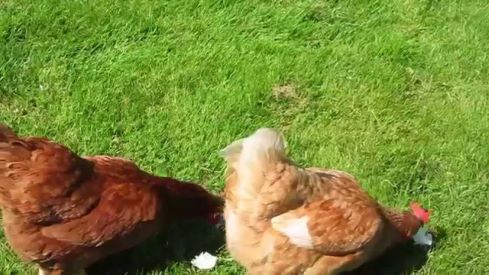
No, chickens should not eat moldy tomatoes. Moldy foods can be dangerous for chickens, as they can contain toxins that can make your chicken sick. If you have a moldy tomato, it is best to throw it away.
While some types of mold may be safe for your chickens to eat, it is better to be safe and avoid feeding them moldy foods altogether. If you are unsure whether a food is safe for your chickens, it is best to consult with a veterinarian or chicken expert.
Raw or cooked tomatoes – which is better?
Most people think of tomatoes as a healthy food but may not realize they can also be good for chickens. You can feed tomatoes to chickens raw or cooked, and both have their benefits.
Raw tomatoes are a good source of vitamins and minerals, and they can help chickens stay hydrated. Cooked tomatoes are easier to digest and can provide chickens with a warm, comforting meal.
However, it’s important not to add any flavorings when cooking tomatoes for chickens, as they may not be able to digest them properly.
Raw and cooked tomatoes can be a healthy addition to a chicken’s diet.
Ripe or unripe tomatoes – which is better?
It is a common belief that ripe fruits are better for chickens to eat than unripe ones. After all, ripe fruits are sweeter and juicier, making them more attractive to chickens.
Additionally, ripe fruits are easier to digest than unripe fruits, which can cause digestive issues in chickens.
However, there is a bigger downside to feeding unripe tomatoes to chickens: they can contain harmful compounds called solanine. Solanine is found in high concentrations in unripe tomatoes and can be toxic to birds.
As a result, it is important only to feed ripe tomatoes to chickens. They will be easier on their digestive system and free of harmful toxins.
Can tomatoes affect a hen’s egg quality?
Overfeeding your hens with fresh tomatoes can have a detrimental effect on their egg quality.
Hens that eat too many tomatoes can produce eggs with softer shells. This is due to the high acidity of tomatoes, which can interfere with the hen’s calcium absorption.
If you want your hens to produce eggs with strong shells, limiting their intake of fresh tomatoes is best.
The high volume of nutrients in tomatoes can also affect the taste of a hen’s eggs. Hens that eat a lot of tomatoes may produce eggs with a slightly more acidic flavor.
Do chickens like the taste of tomatoes?
Chickens are interesting creatures, and their eating habits are no exception. While they will happily peck at just about anything, it is still unclear what they like the taste of.
Some chicken owners have reported that their birds enjoy tomatoes, while others say that their chickens avoid them. The truth is probably somewhere in the middle.
Chickens have a strong sense of smell and may be attracted to the scent of tomatoes. However, they may not enjoy the taste once they start eating them.
Ultimately, it is up to each chicken to decide whether or not they like the taste of tomatoes.
What other vegetables can chickens eat?
For many chicken owners, regularly enjoying fresh eggs is one of the best parts of caring for chickens. But there’s more that you can do to keep your chickens healthy and happy than simply feeding them eggs. Providing them with various vegetables is another way to ensure they get all the nutrition they need. Tomatoes are an especially popular choice, but what other vegetables can chickens eat? Let’s take a look.
Celery
Celery is packed full of essential vitamins and minerals such as vitamin A and potassium. It also contains plenty of fiber which helps keep your chickens’ digestive system running smoothly. Cut celery into small pieces or shred it before feeding it to your birds.
Read More: Can Chickens Eat Celery? 5 Fantastic Benefits
Cucumbers
Cucumbers have a high water content, which means they help keep your chickens hydrated in hot weather. They are low in calories but contain plenty of vitamins and minerals, including magnesium and potassium, and antioxidants like vitamin C and beta-carotene.
Small chunks or slices are best for hearty eaters and picky peckers alike!
Read More: Can Chickens Eat Cucumber? 6 Amazing Benefits
Bell Peppers
Bell peppers come in various colors, from green to red to yellow, each with a unique flavor profile and nutritional benefits. They contain vitamins A, B6, C, E, and K, as well as lycopene, which helps protect cells from environmental damage caused by free radicals.
Chop bell peppers into small pieces before offering them up to your flock, so they don’t choke on large chunks.
Read More: Can Chickens Eat Bell Peppers? 4 Important Benefits
Radishes
Radishes are crunchy and sweet – a great snack for any chicken. They contain plenty of fiber which aids digestion, and also have a significant amount of vitamin C along with smaller amounts of calcium and iron.
Be sure to cut radishes into small pieces for smaller birds or chicks who might have difficulty swallowing larger chunks.
Read More: Can Chickens Eat Radishes? 6 Awesome Benefits
Beets
Beets are full of antioxidants that help protect cells from damage caused by environmental pollutants like smoke or exhaust fumes common in urban settings where many chicken owners live.
Chop beets into small pieces before offering them up so that chickens don’t choke on large pieces or swallow them whole without chewing properly.
Read More: Can Chickens Eat Beets? 5 Excellent Benefits
Can chickens eat tomatoes – final thoughts
Chickens can eat tomatoes, and there are benefits to doing so. Just be sure to feed them as part of a healthy and balanced diet. Watch out for potential problems, such as excess sugar, and ensure the tomatoes are fresh and ripe. Rotten tomatoes can make chickens sick, so avoiding them is best.
